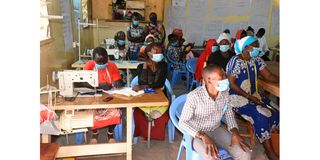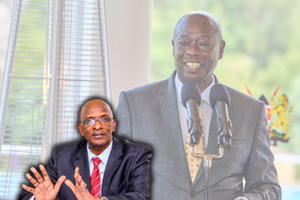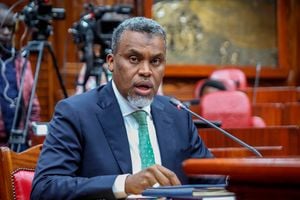Kenyan body wins funding to empower female refugees

Refugees at Kakuma Refugee Camp in Turkana County during a fashion design on December 18, 2020. A Kenyan organisation is one of nine African and Middle Eastern projects that have received funding to empower refugee women and girls.
What you need to know:
- Kenyan organisation RefuSHE, among 34 selected to receive funds from the Google.org Impact Challenge to empower refugee women and girls.
- Through the funding, RefuSHE will provide digital skills training and opportunities to connect to the growing online freelance economy, to enhance the resilience and economic independence of young refugee women in urban Kenya.
A Kenyan organisation RefuSHE, is among 34 selected to receive funds from the Google.org Impact Challenge to empower refugee women and girls.
The $25 million philanthropy initiative was launched in March, with a challenge to the global non-profit community to submit their most innovative ideas to create a more equitable economic reality for women and girls.
RefuSHE’s project is one of nine African and Middle Eastern projects selected for the funding cohort out of nearly 8,000 applications globally.
Through the funding, RefuSHE will provide digital skills training and opportunities to connect to the growing online freelance economy, to enhance the resilience and economic independence of young refugee women in urban Kenya.
Digital skills
The organisation will also participate in a four-month accelerator program led by Google’s Accelerator and Women Techmakers communities and Impact Challenge partner Vital Voices, to move projects forward.
RefuSHE will implement the project with its partner Konexio, a body that promotes the inclusion of refugees and disadvantaged populations in the workforce through digital skills training and job access.
Speaking during the virtual unveiling of the projects selected, Interim CEO of RefuSHE Doris Nelima, said with the help of Google.org Impact Challenge for Women and Girls, the organisation together with its partner, will address the lack of economic opportunities for refugee women in Kenya.
“This support come at a critical time and will be used to train 180 young refugee women in digital skills that will help them access online employment opportunities,” she said.
War, conflict and violence
US-based Director of RefuSHE Dina Dukhqan, noted that the young women in the organisation's programs have been affected by war, conflict, and violence
“This program is a win-win, not only because it graduates these women into economic independence, but also contributes to the global market workforce needs. We want to demonstrate that online freelance work in the digital economy is a viable livelihood solution for refugees,” she said.
Konexio Co-Founder and CEO Jean Guo, said their aim is to foster a world where no one misses out in the digital society.
“Our mission is to turn this digital transformation into an opportunity in Kenya, so we look forward to working alongside RefuSHE and Google.org to bring about a world in which every woman is able to realise her full potential, have equal access to opportunity, and contribute meaningfully to society,”
Jacqueline Fuller, President of Google.org said the Covid-19 pandemic has made women nearly twice more likely to lose their jobs than men.
Pandemic recovery
“It’s vital that we elevate and support work that empowers women and girls to reach their full economic potential, especially in marginalised communities. The pandemic recovery must be an inclusive one, and we know that when we invest in women and girls, we all benefit,” she said.
Google.org partnered with a women-led panel of experts, including Graça Machel and Phumzile Mlambo-Ngcuka, and gender equity-focused organisations Vital Voices and Project Everyone.
Since 2008, RefuSHE has operated in Nairobi, Kenya supporting refugee girls and young women targeting on their needs for protection, education, and empowerment.
According to the United Nations High Commissioner for Refugees (UNHCR), Kenya is among the top refugee hosting countries in Africa, currently holding more than 500,000 refugees.
Urban areas
The UN agency indicates that the majority of refugees and asylum seekers in Kenya originate from Somalia (54 per cent).
Other major nationalities are South Sudanese (24.6 per cent), Congolese (9 per cent); Ethiopians (5.8 per cent).
Refugees from Sudan, Rwanda, Eritrea, Burundi, and Uganda among others make up 6.8 per cent of the total population.
UNHCR indicates almost half of the refugees in Kenya (44 per cent) reside in Dadaab, 40 per cent in Kakuma and 16 per cent in urban areas (mainly Nairobi), alongside 18,500 stateless persons.





